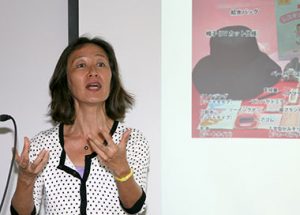Training Women for Disasters: Gender, "Crisis Management (Kiki Kanri)" and Post-Fukushima Nationalism in Japan
/ 18時半
Mire Koikari, Professor, University of Hawaii at Manoa,Women’s Studies
Following the Great East Japan Earthquake in 2011, Japan has witnessed a proliferation of discourses where people are enticed by the notion, “Rise up, Japan,” to participate in national recovery and reconstruction. In it, women are mobilized as chief practitioners of “crisis management” whereby they are urged to acquire a series of techniques, technologies, as well as dispositions in order to cope with the current crisis and prepare for future emergencies. Examining disaster management discourses and practices that proliferate via websites, instructional manuals, and community fairs in post-Fukushima Japan, this presentation analyzes how the emerging culture of crisis management pursues gendered strategies as it instructs women to maintain proper bodies and orderly homes so as to ensure their own and their families’ survival in large-scale disasters and crises. Far from a top-down imposition, it is a bottom-up endeavor where women leaders, intellectuals, and crisis management advisers insist on the importance of women’s involvement in national affairs. Situating the current crisis management culture in a larger historical context, the presentation points to its similarities to the pre-1945 Japanese life improvement movement and the cold war US civil defense programs where women and home also constituted the focal sites of discipline and regulation, thereby suggesting a need to critically re-examine and re-consider the meanings of women’s mobilization to the post-disaster nation.
Mire Koikari is Associate Professor of Women’s Studies at the University of Hawai‘i. Her publications include Pedagogy of Democracy: Feminism and the Cold War in the US Occupation of Japan 1945 – 1952 (Temple University Press, 2008). Currently she is a Japan Foundation research fellow in Okinawa where she is pursuing her project entitled “Making Homes, Building Bases: Women, Militarism, and Cold War Transnationalism the US occupation of Okinawa”. In this project, she examines the ways in which domesticity and militarism became linked with each other in postwar Okinawa to mobilize women and home to cold war US expansionism.
